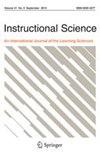利用沉浸式虚拟现实教室对大鱼小塘效应进行实验测试
IF 2.1
3区 教育学
Q1 EDUCATION & EDUCATIONAL RESEARCH
引用次数: 1
摘要
学术自我概念在成功学习中起着核心作用,并在很大程度上受到社会比较的影响。对“大鱼小塘效应”(big fish - little - pond Effect, BFLPE)的研究发现,在控制个人成就的情况下,较高的班级/学校平均成绩对学生自我概念的负面影响具有高度稳健和可推广的模式。然而,大多数BFLPE研究并没有提供关于其背后原因或潜在影响机制的信息。为了解决这个问题,我们使用了一个完全沉浸式虚拟现实(IVR)教室来实验测试学生将与表现相关的课堂行为识别为内隐社会比较信息的程度,以及这些感知如何解释学生自我概念的差异。参与者(N = 381名六年级学生)与表现出不同表现水平的虚拟同学一起体验了真实而标准化的IVR教学情境(20%、35%、65%、80%的同学举手)。举手行为对学生对班级成绩水平的感知有显著的正向影响(d 20% vs. 65% = 0.60;D 20% vs. 80% = 1.24)。与BFLPE一致,结果显示高绩效同学对学生情境自我概念的负向影响(d 20% vs. 80% = 0.30)。学生对班级表现水平的感知充分解释了同学举手行为对学生情境自我概念的影响。该研究的实验方法为课堂中社会比较效应的出现提供了新的见解,突出了学生对同学表现相关行为的感知的主要作用,并且还展示了在课堂研究中使用IVR的总体潜力。本文章由计算机程序翻译,如有差异,请以英文原文为准。

An experimental test of the Big-Fish-Little-Pond Effect using an immersive virtual reality classroom
Abstract Academic self-concept plays a central role in successful learning and is substantially shaped by social comparisons. Research on the so-called Big-Fish-Little-Pond Effect (BFLPE) has yielded a highly robust and generalizable pattern of negative effects of higher class/school average achievement on students’ self-concept when controlling for individual achievement. However, most BFLPE studies have not provided information about the causes behind or the mechanisms underlying the proposed effects. To address this, we used a fully immersive virtual reality (IVR) classroom to experimentally test the extent to which students recognized performance-related classroom behavior as implicit social comparison information and how these perceptions explained differences in students’ self-concepts. Participants ( N = 381 sixth-grade students) experienced an authentic yet standardized IVR teaching situation with virtual classmates who exhibited different performance levels (operationalized as 20% vs. 35% vs. 65% vs. 80% of classmates raising their hands). Hand-raising behavior had a significant positive effect on students’ perceptions of the class’ performance level ( d 20% vs. 65% = 0.60; d 20% vs. 80% = 1.24). In line with the BFLPE, results showed a negative effect of higher performing classmates on students’ situational self-concept ( d 20% vs. 80% = 0.30). Students’ perceptions of the class’ performance level fully explained the effect of classmates’ hand-raising behavior on students’ situational self-concept. The study’s experimental approach provided new insights into the emergence of social comparison effects in the classroom, highlighting the major role of students’ perceptions of their classmates’ performance-related behavior, and moreover demonstrated the general potential of using IVR in classroom research.
求助全文
通过发布文献求助,成功后即可免费获取论文全文。
去求助
来源期刊

Instructional Science
Multiple-
CiteScore
4.80
自引率
4.00%
发文量
35
期刊介绍:
Instructional Science, An International Journal of the Learning Sciences, promotes a deeper understanding of the nature, theory, and practice of learning and of environments in which learning occurs. The journal’s conception of learning, as well as of instruction, is broad, recognizing that there are many ways to stimulate and support learning. The journal encourages submission of research papers, covering a variety of perspectives from the learning sciences and learning, by people of all ages, in all areas of the curriculum, in technologically rich or lean environments, and in informal and formal learning contexts. Emphasizing reports of original empirical research, the journal provides space for full and detailed reporting of major studies. Regardless of the topic, papers published in the journal all make an explicit contribution to the science of learning and instruction by drawing out the implications for the design and implementation of learning environments. We particularly encourage the submission of papers that highlight the interaction between learning processes and learning environments, focus on meaningful learning, and recognize the role of context. Papers are characterized by methodological variety that ranges, for example, from experimental studies in laboratory settings, to qualitative studies, to design-based research in authentic learning settings. The Editors will occasionally invite experts to write a review article on an important topic in the field. When review articles are considered for publication, they must deal with central issues in the domain of learning and learning environments. The journal accepts replication studies. Such a study should replicate an important and seminal finding in the field, from a study which was originally conducted by a different research group. Most years, Instructional Science publishes a guest-edited thematic special issue on a topic central to the journal''s scope. Proposals for special issues can be sent to the Editor-in-Chief. Proposals will be discussed in Spring and Fall of each year, and the proposers will be notified afterwards. To be considered for the Spring and Fall discussion, proposals should be sent to the Editor-in-Chief by March 1 and October 1, respectively. Please note that articles that are submitted for a special issue will follow the same review process as regular articles.
 求助内容:
求助内容: 应助结果提醒方式:
应助结果提醒方式:


